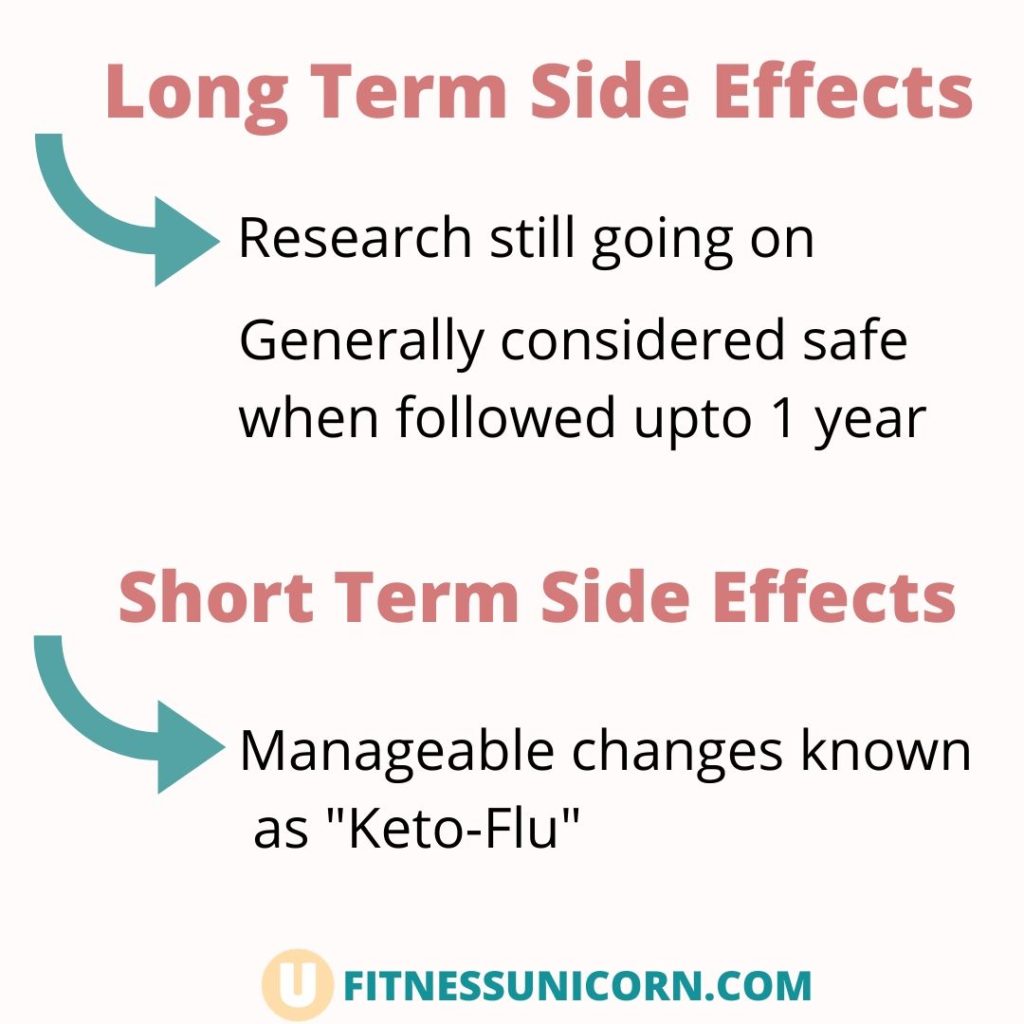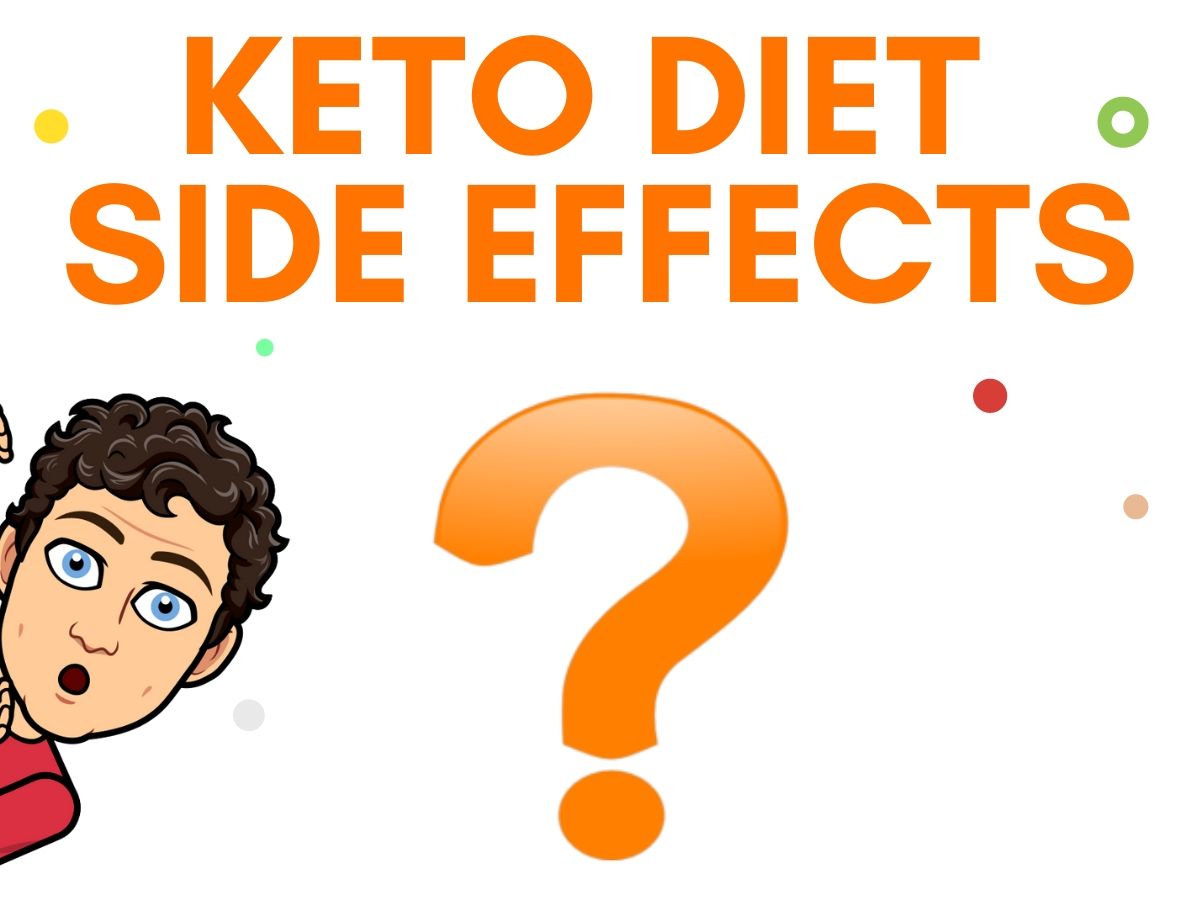The main working principal of keto diet is reducing your carb intake significantly (consuming less than 30 grams per day) in order to burn the stored body fat.
This can be quite intimidating at first and you might question about the keto diet side effects.

If you are someone interested in fitness or wondering how to lose weight, you might have heard about the scientifically proven Keto Diet or Ketogenic Diet.
Read our article where you will find keto diet explained for complete beginners.
Let us find out the long term and short term keto diet side effects…
Long term keto diet side effects
There is not enough data in the industry for the long term side effects of the diet. However, a study recommends that you can keep your keto diet for upto 12 months.
“My professional recommended period of following the keto diet is about six months maximum, and that will also depend on how much the person weighed prior to starting the diet and the state of his or her overall health within those six months,” quoted by Nikola Djordjevic, MD, of MedAlertHelp.org.
There are also many people who have made keto a lifestyle and are following this since years. No complications have been found in healthy adults.
If you still want to practice keto even after 12 months, give your system a break for at least 6 months and then get back again.

Short term keto diet side effects
Short term keto diet side effects are just a few changes your body goes through while adapting to your new diet and lifestyle, in order to boost your keto weight loss. Such effects come under the umbrella of “Keto Flu”.

The keto flu isn’t actually a flu but a sign of your system shifting to ketosis. It is your body’s response to carb restriction. Keto flu is neither dangerous nor contagious.
Your body is used to utilizing carbs for energy requirements. Once, you begin to shift your primary source of fuel, your system starts to adapt.
We will also tell you few remedies to minimize these short term keto diet side effects later on in this article.
READ: How Many Carbs Ketosis Requires
Keto Flu: Symptoms, Causes & Remedies
Symtoms of Keto Flu
All of the possible symptoms of the famous “Keto flu”, as reported by many followers worldwide, are the following:
- Sugar cravings
- Irritability
- Muscle soreness
- Poor focus and concentration
- Stomach pains
- Nausea
- Cramping
- Dizziness
- Brain fog
- Insomnia
You might encounter one or more of these symptoms during the first 10 days into the diet, especially between the first week. There is a very small segment of people who find these disturbing their daily routine and that is why keto is bad for some people.
Luckily, you’ll be fine super soon as these are only temporary changes. In fact, it’s possible you will have more energy than before you started the diet.
PS: Don’t be disheartened by seeing this long list of keto diet side effects/ keto flu. One is likely to experience only two or three symptoms or none at all. Note that this varies greatly from person to person.
This is due to the difference in metabolic flexibility of each individual. Some of us are genetically gifted to be suited for ketogenic diet and we might not experience even a single symptom of the keto flu.
Read along to find out the remedies for keto flu. But first let us see the scientific reasons behind such a phenomenon.
What are the scientific reasons behind the keto flu?
1. Increase in Cortisol levels
Human body has complicated mechanisms set in place to respond to various situations. When you restrict carbohydrates to this extent, your body goes into a starvation-like mode.

This leads to an increase in the stress hormones (mainly cortisol) and the effects that come with it. You will know when you have high cortisol levels than before when you feel more irritable and your sleep quality is lowered.
If you have already started keto you might be wondering “Why am I exhausted on the keto diet?”.
Once you completely adapt to this new diet, you will feel much better as your body starts utilizing stored fat more efficiently.
2. Decrease in T3 Thyroid Levels
Carbohydrates are an important factor for T3 Thyroid production in our bodies. Low T3 levels are associated with lower physical function in old aged men.
There are some levels of dietary carbohydrate that can cause changes in thyroid and thyroid hormone function. However, the results from various studies indicate that this varies from person to person.
Healthy adults are unlikely to have any complications due to this keto diet side effect.
3. Depletion of water and sodium levels in the body
Reduction in carbs significantly lowers your insulin levels. Insulin is the hormone widely known to signal your body to begin storing fat.
However, insulin also has another role: Signaling the kidneys to hold water and sodium. When insulin levels begin to drop, your body releases sodium along with water.
The magical weight loss in the first week of keto is due to this phenomenon. You can lose up to 10 pounds within the first week of your keto diet.
The majority of keto flu symptoms or keto diet side effects are due to this water loss from your body.
How to Remedy the Keto Diet Side Effects?
Now comes the part where you will be most interested in. You might have already started your keto weight loss journey and encountered some of the listed symptoms. Or you might be a newbie to the program and wondering how to eliminate these side effects.
After going through all the symptoms, now let use find out how you can remedy these to streamline your weight loss journey.

1. Ensure Sufficient Sleep
The first and basic remedy for high cortisol levels is getting a sweet good night sleep. Aim for 8 hours of sleep each night in your keto journey. This will boost your feel good hormones and lower the stress hormones.

You might sometimes find yourself tired and exhausted during the day. If you happen to be at home, take a quick nap or meditate for 15 minutes and watch your stress vanish into thin air.
Take out 15 minutes from your busy schedule and simply sit in silence and take long, slow, and deep breaths. You will soon find thoughts and urges trying to grab your attention, just acknowledge their presence and go back to your breath. That’s meditation in its simplest form.
The goal is to be more relaxed throughout the day so that it doesn’t burden your body which is already working hard to get into ketosis. Either way, being more mindful and relaxed can work wonders for your mind and body.
Supplementing with magnesium will also help you to increase sleep time and sleep efficiency.
2. Consume more Sodium, Potassium & Magnesium
As we already stated, decrease in insulin levels due to keto will also flush out sodium and potassium from your body. The result can be headaches, fatigue, cramps, constipation or feeling lightheaded.
So you might be wondering which keto diet foods are rich in the above mentioned minerals. We recommend the following inclusions in your diet to better manage the keto diet side effects:

- Potassium: Include avocados and green leafy vegetables
- Sodium: Add some unrefined salt on every meal and in your glass of water
- Magnesium: Throw in some pumpkin seeds, almonds and spinach
However, if you are working round the clock, it might be difficult to keep track of all the micro nutrients in your keto diet routine. You can try supplements form the market to fulfill these needs.
Talking about magnesium supplements, magnesium citrate will give you the most value for your money. It gets absorbed easily but some people may have a mild laxative effect.
Recommended doses for each mineral:
- Magnesium-
For men: 400 mg per day
For women: 310 mg per day - Sodium-
5 to 7 grams of unrefined salt per day - Potassium-
3,500 mg per day for people ages 16 and up
In a nutshell, ensure that you have at least one teaspoon of salt and food rich in magnesium and potassium to fight the keto diet side effects.
TRENDING: Keto Cheat Day Tips
3. Light Exercise in Morning
It is really beneficial to supplement your keto diet with some form of light exercise. This will work as a double edged sword as it will help you lose weight faster and also relieve you of keto flu symptoms.

However, excess sweating can cause dehydration and loss of essential minerals as mentioned in the previous point. Just make sure that you keep yourself hydrated and your mineral tank full.
Fill up a bottle with water and a pinch of salt and take it along to your workout.
4. Eat More Fats to Minimize Keto Diet Side Effects
Increase your intake of the basic component of keto diet: Fats. They provide the liver cells acetyl-CoA which is used to generate ketones (which provide energy).
(READ: Why am I exhausted on keto?)
One of the famous terms in the Keto industry is Fat Bombs. These are quick recipes to get you a major dose of fats for ketosis.
However, most fats aren’t readily utilized as fuel while your body is entering ketosis. This is when MCT Oils come for your rescue.
MCT oil is a supplement made from a type of fat called medium-chain triglycerides. MCT molecules are smaller than those in most of the fats you eat (LCT – Long-chain Triglycerides ) which is why they are readily absorbed in your bloodstream.
MCTs will help you adapt to ketosis more quickly and effectively. Combined with the right exercise, MCTs will relieve you of many keto flu symptoms or keto diet side effects.
FAQs
What are the negative effects of a Keto Diet?
While entering into ketosis, your body goes through a short term “Keto-Flu”. Tiredness, fatigue, stomach cramps, and dizziness are some of the symptoms.
Is Keto safe long term?
Studies claim that it is very safe to stay on Keto Diet for up to 12 months. Many people have been following Keto for years without any complications.
How long do keto side effects last?
Symptoms of the Keto-Flu can last for up to 2 weeks in most people. However it takes around 4 weeks for your body to become keto-adapted.
How much weight can you lose in a week on keto?
You can lose up to 10 pounds within the first week, which consists of majorly water weight.
How much weight can you lose in a month on keto?
You can lose 4 to 10 pounds of weight per month safely. As you become more keto adapted, you will burn more fat.
Conclusion
Try to follow the above mentioned tips and your keto flu will lift off in no time. This will make your fat loss journey easier and help you stick to the routine.
Once your keto flu lifts up, you will feel more energized, less hungry and overall much happier and healthier.
Here is our recommendation to slowly and gradually move towards keto lifestyle if you have been a foodie who usually binges on tubs of ice cream and fast food.
Try to cut a single carbohydrate source from your diet each week. For example:
- 1st Week: Eliminate soda and sugary drinks with no carb drinks like coke zero.
- 2nd Week: Drop desserts and sugary snacks like cakes, ice cream, pie, sweets, etc.
- 3rd Week: Get rid of fast food items like pasta, pizza, chips, wafers or other packaged snacks.
- 4th Week: Eliminate the major source of carbs: Bread
This way, you will be ready to start your keto diet plan within a month and on your way to lose some serious weight through ketosis.
We hope you got a satisfactory explanation for keto diet side effects.

